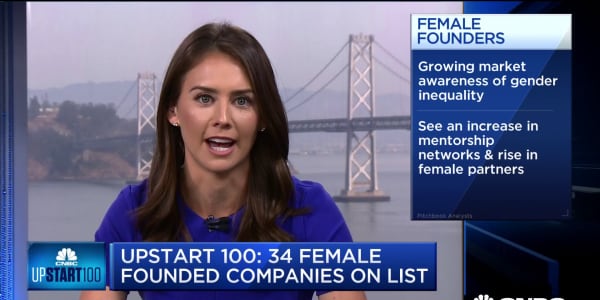Start-ups are staying private longer than ever before. Names like Uber and Airbnb became multinational corporations well before contemplating IPOs. In this environment, there's a risk of overlooking fascinating start-ups earlier in their breakthrough stories.
CNBC's first-ever list of promising young start-ups is a diverse group of companies that are building brands, breaking industry barriers and scaling quickly on the path to becoming tomorrow's household names.
The entrepreneurial spirit is alive and well all over the country and around the world and taking place at a level well below the billion-dollar unicorn club.
Venture capital funding is top-heavy in terms of deal dollars. Later-stage VC investments reached $40 billion or more annually in the past three years, according to PitchBook. But in 2016 the overall number of later-stage deals hit its lowest mark since 2010. Meanwhile, angel/seed capital has grown from $600 million in 2006 to $6.6 billion in 2016 and by far represents the largest number of deals. In the past two years, early VC funding reached a decade-high of $24.5 billion.
Here's how we chose our 25 upstarts.
Companies nominated were required to submit a detailed questionnaire and confirm their eligibility for the Upstart 25. To be eligible, companies had to be privately held and younger than 5 years old. Companies also must have been pre-Series B in their funding and raised no more than $50 million. We set a funding cap rather than use company-by-company funding levels as one of the ranking criteria.
After the criteria was determined and the data was compiled and compared, CNBC's Upstart 25 Advisory Council — a group of 39 leading academics and analysts specializing in innovation and entrepreneurship (see list below) — ranked the criteria by how important each is to building a sustainable company.
The council found scalability to be the most important factor, followed by user growth and sales growth. However, our ranking model is designed to ensure that companies must score highly on a wide range of criteria to make the final list. We also reviewed company milestones, access to capital and industry-specific hurdles.
We also enlisted the help of three data partners who provided consistent data for a range of criteria. We used IBISWorld's database of industry reports to compare the companies based on the industries they are attempting to break into. Intellectual property specialist MCAM International provided visibility into how nominee companies protect the technology at the foundation of their business models.
PitchBook provided data on fundraising (as of Feb. 1), which we used to confirm company eligibility. However, fundraising was a determining factor for the list itself.
We added factors for gender and geographic diversity. Ten of the 25 companies that made the list have women founders, and the Upstart 25 are based in five different countries and eight different U.S. states. This is not, nor was it ever intended to be, a list exclusive to Silicon Valley.
More than 500 start-ups responded to our call for submissions, supplying information about the company's founders, investors, growth, recent milestones and more. Using the Advisory Council's weights, companies were scored and ranked. A final editorial review gave us the 25 companies we are proud to call the first annual CNBC Upstart 25.





